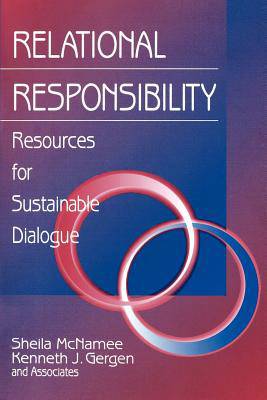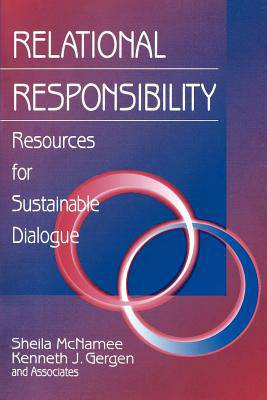
Je cadeautjes zeker op tijd in huis hebben voor de feestdagen? Kom langs in onze winkels en vind het perfecte geschenk!
- Afhalen na 1 uur in een winkel met voorraad
- Gratis thuislevering in België vanaf € 30
- Ruim aanbod met 7 miljoen producten
Je cadeautjes zeker op tijd in huis hebben voor de feestdagen? Kom langs in onze winkels en vind het perfecte geschenk!
- Afhalen na 1 uur in een winkel met voorraad
- Gratis thuislevering in België vanaf € 30
- Ruim aanbod met 7 miljoen producten
Zoeken
Relational Responsibility
Resources for Sustainable Dialogue
Sheila McNamee, Kenneth J Gergen
Paperback | Engels
€ 177,45
+ 354 punten
Omschrijving
The tradition of individual responsibility where individuals deliberate, morally evaluate, and then decide on a course of action is dear to the heart of Western ethical and legal codes and informs many contemporary practices of therapy, education, and organizational life. It also typically isolates, alienates, and ultimately invites the eradication of the otherùa step toward non-meaning. A vast range of current thinking places this view of the independently responsible individual in strong question. In Relational Responsibility, the authors attempt to transform the concept of responsibility in such a way that the relational process replaces the individual as the central concern. This volume invites practices that replace alienation and isolation with meaning-building dialogue. It is structured in a way that demonstrates their ideas. In Part I, McNamee and Gergen examine relational responsibility followed by their analysis of a challenging case study involving the issue of child sexual abuse. Part II contains responses from scholars and practitioners from the fields of communication, psychology, therapy, and organizational development that extend the original dialogue set out by McNamee and Gergen. Part III is a rejoinder to Part II in redirecting and augmenting the original conception and practice of relational responsibility. Relational Responsibility touches on a number of different disciplines, including communication theory, sociology, social theory, interpersonal and group communication, conflict management, and child abuse.
Specificaties
Betrokkenen
- Auteur(s):
- Uitgeverij:
Inhoud
- Aantal bladzijden:
- 248
- Taal:
- Engels
Eigenschappen
- Productcode (EAN):
- 9780761910947
- Verschijningsdatum:
- 1/10/1998
- Uitvoering:
- Paperback
- Formaat:
- Trade paperback (VS)
- Afmetingen:
- 153 mm x 226 mm
- Gewicht:
- 385 g

Alleen bij Standaard Boekhandel
+ 354 punten op je klantenkaart van Standaard Boekhandel
Beoordelingen
We publiceren alleen reviews die voldoen aan de voorwaarden voor reviews. Bekijk onze voorwaarden voor reviews.









